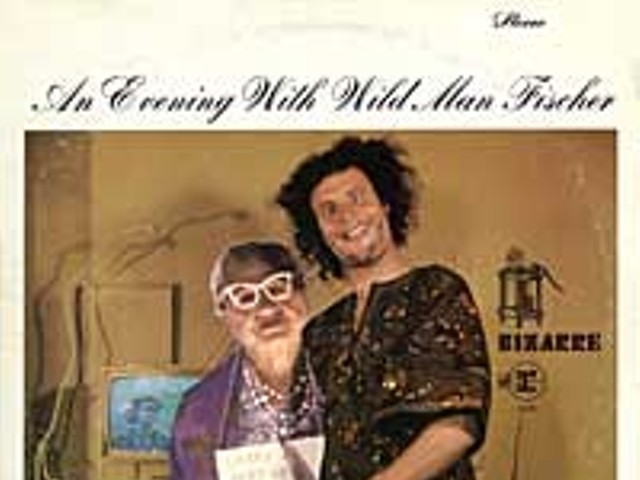Saturday Looks Good To Me’s Fred Thomas and rapper Bareda aka Mr. Wrong, would never in this lifetime be captured sitting in a room together yakking about music or larger issues such as musical segregation in Detroit.
I mean, rap shows in Detroit are mostly all-black affairs. Rock shows are mostly all-white. A good rap show here, like, say, Bereda’s Raw Collection, has undercurrents of good ol’ Southern gospel — spirit, community and participation. A good rock show, like, say, Thomas’ Saturday Looks Good To Me, can be equally moving on different levels, if not just for the joy of the hook and literate introspection. Both are entertaining as hell, but the segregation is palpable.
What’s more, Thomas and Bareda are the same in many ways, fighting the Motor City fight, but on opposite sides of the pop spectrum while attempting to get their respective careers to the point of self-sustenance. And both Thomas and Bareda are brilliant (yes, brilliant) — this music editor’s fave pop songwriter and fave Detroit rap lyricist, respectively.
Thomas, you’ll note, is a hyper-intelligent and sensitive white boy with elevated pop songsmithing skills; hell, he’s a walking, talking Brill Building. His rep overseas is swelling. In fact, the kid’s been called an indie-pop genius in the international press.
Bareda is from the West Side streets; he’s a walking, talking rhyme machine whose narrative abilities are elevated above his Detroit peers. In his lines, there are running subtexts of empathy for his subjects — something that’s rare in rap, anywhere — a 60-cycle hum of sensitivity under the street bravado. The rapper just (finally) inked a worldwide deal with Tantrum/Universal. Producer possibilities for his major label debut include Timbaland, Jazze Pha and maybe Scott Storch.
In short, 2006, for these guys, is laid out like months of, um, Saturdays, or something.
So I brought both Thomas and Bareda down to my office to do this thing we nicked directly off American Bandstand. This time around it features new or fairly new locally related music. I play a song (or songs) from each record, and don’t reveal to the guys who or what I’m spinning until after they offer comments.
Emelee Kiss and Tell (Barak)
Sexed-up Toledo teen on local label wows
Fred Thomas: That was great, a super-crisp, late-’70s disco-style production; vocals are good. It’s super-sharp. Maybe a little reaching; one of the lyrics, “You don’t know what you do to me/With what I feel for thee” or something, was a stretch.
Bareda aka Mr. Wrong: I definitely love it. It’s a hit. You know what I mean? It definitely brings, like he said, a ’70s feel. Awesome joint. I actually wanted to sample it [laughs]. It gives you that feeling of spring, when the snow is meltin’ and you go out and hear the water off your tires. That’s what I felt. So I love it.
Crud Devil at the Wheel (self-released)
Bareda interjection: “Do we have to listen to the whole thing
Thomas: [Laughs, then pauses to find kind words.] To me, the music we just heard doesn’t really represent any real feelings or any actualized ... It doesn’t have that feeling when you wake up in the morning and you feel a certain way and you want to write a song about it. I’m sure it took a lot of work and they thought it through. But it sounds like some dude who works at Guitar Center, and has a band. There’s nothing new there, nothing that would be exciting even 10 years ago.
Bareda: It’s not really, you know, my type of music. But, uh, it’d be great on a video game, like one of those drivin’ real fast things [laughs]. In my ride? Nah, not at all.
Grinder Out of Our Heads (self-released)
The fact that Stooge Ron Asheton and MC5er Mike Davis guested on this doesn’t impress these guys.
Thomas: It’s pretty by-the-numbers, punkish, rock ’n’ roll. Not bad or good; right in the middle. The distorted vocals, everything — you know what’s going to happen before it happens. It’s not shitty or useless, but it’s certainly not exciting, even though it’s charged up.
Bareda: Another great video game song, I must say [laughs]. But it’s not bad. Actually, I could take this one a lot longer than the other one [Crud]. I like the melody, the breakdown; I love the intro, it was bananas.
Raw Dog Raw Dirty Dog Ass Shit
(Nigger Street-Trash Noize)
Puffed-up porn rap makes the mouths gape, eyes roll
Bareda: [With face pinched] That is hor-eee-bullll. I mean widda a capital whore [laughs]. That was embarrassing. Man, please, is that Detroit hip hop, for real? Noooo. I don’t know what the fuck that was. I swear I was about to leave. You almost put me outta here with that one.
Thomas: What we just heard had all the production values of a late-’80s Ghetto Boys album. It had all the rhyme power of a sixth-grader’s notebook — completely juvenile in a retarded way that isn’t good.
Kenny Flav Presents Wayne Kounty: Fantasy World (Premier Cru)
The shit, chief
Bareda: That was really dope, classic. That was George Clinton if I’m not mistaken, wasn’t it? I like the new vibe that he’s coming out on. Who is this? Oh, Kenny Flav! That’s my man. Clinton’s a guest! Dope. It’s bananas.
Thomas: That sounded great. Super-musical. The production style was so good, lots of layered textures and weird electronic stuff going on, but mellowed.
Hard Lessons Gasoline (No Fun)
Obvious? Bareda’s never heard ’em
Thomas: The Hard Lessons? Awesome band. I would marry them. One of the better live rock bands around. Such a good live band that it’s difficult to capture that kind of energy on the record, and I listened to this record a few times. The record’s good, but the live show is where this band is great.
Bareda: Has a nice raw sound. It’s almost like they didn’t record in the studio; it’s like somebody sat there with a microphone and just recorded them playing. That’s the sound I feel. I like it, though.
Stevie Wonder A Time to Love (Motown)
Four eyes close to listen
Bareda: It sounds like Dr. Dre meets Stevie Wonder meets Kirk Franklin. It’s not a Stevie Wonder vibe that I’m used to, so it’s not catchin’ me like a normal Stevie joint. But, that’s a beat I’ll rap over.
Thomas: I really agree. I was talkin’ to a friend of mine recently and we were talking about Stevie Wonder records in the ’70s. He’d never heard them. He knew “Part-time Lover” or whatever. Then he heard some of the older stuff and he said it was like if “God made a record.” And those records are so deep and fantastic and multi-instrumental; so layered and melodically challenging. And I think this is definitely better than the last four Stevie Wonder records; it’s going back more toward a dense, spiritual thing — but maybe pushing a little too hard to get there. So it’s going in the right direction. But given that he’s made some of the best music ever in the world — that can be forgiven.
John Arnold feat. Ty “Style and Pattern (nuff version)” 12” (Ubiquity)
Blah blah blah
Bareda: That some bull-shiiit. OK, excuse me. ... I think they could’ve gotten more creative in the studio. I think they could have been more creative with the chorus, creative with the rappers and the producers. I think it could have been overall more creative.
Thomas: I concur.
Slum Village Slum Village (Barak/Capitol)
Bananas, anyone?
Bareda: Elzhi is bananas. His lyrics are always on-point, not to mention the fact he don’t water his lyrics down; that’s just all in his head. I think Slum is dope.
Thomas: It’s good. They’re trying to find their own voice again. It has a beautiful, beautiful sound.
Black Bottom Collective “Interview with a Porn Star” from People Mover (BBC)
Listen Here
Disclaimer: BBC’s K.K. Turner is an MT contributor
Bareda: That was very, very creative. Um, it was poetry-slash-interview-slash-song. It’s very different; something I wouldn’t have thought of doing. The format reminds of the MTV Lyricist Lounge show. I like it all. It’s dope.
Thomas: It’s pretty interesting. Musically the first couple things had kinda like a ’93-to-’96 hip-hop vibe, which is good. I think the more poetic stuff was pretty cool. Probably not something I’d listen to every day, but definitely worth listening to.
Brian Smith is the music editor of Metro Times. Send comments to [email protected]




